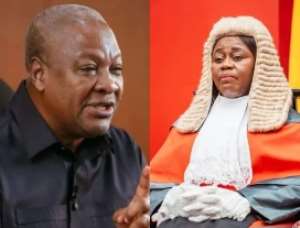
⚖️ A Moment of Reckoning for Ghana’s Democracy
The recent suspension of Chief Justice Gertrude Torkornoo has stirred the foundations of Ghana’s constitutional conscience. From her appointment under President Akufo-Addo to her unprecedented public rebuttal in the wake of suspension proceedings, the episode presents more than a legal standoff — it is a litmus test of our institutional maturity, collective memory, and civic resolve.
At the heart of the matter lies a constitutional paradox: how does a justice sworn to uphold confidential processes navigate a public arena where silence risks misconstruction, but transparency may breach judicial decorum?
🧩 Anatomy of a Crisis
Justice Torkornoo’s appointment — once seen as a victory for meritocratic leadership — met turbulence when three petitions alleging misconduct led to the President John Dramani Mahama’s initiation of Article 146 procedures. Her subsequent suspension, though constitutional, ignited a public spectacle with implications far beyond legalese.
In a defiant press conference, the Chief Justice challenged the integrity of the process, raising concerns over political interference, venue symbolism, and personal safety. Her references to historic trauma — particularly the memory of judicial assassinations — added emotional weight to her refusal to resign.
While some heralded her defiance as courageous, others cautioned that her candor risked violating the very confidentiality clauses designed to protect judicial integrity.
🧭 Navigating Symbolism and Substance
This episode is more than procedural drama — it is a masterclass in civic tension. Can we interrogate power without destabilizing public trust? Can judicial officers defend their reputations without eroding the mystique of the bench? And crucially, what symbolic weight does venue or language carry in a nation still grappling with institutional healing?
The location of the inquiry, “Adu Lodge,” struck a nerve — not merely because of geography, but because it invoked an unresolved national trauma. In a society where symbolism speaks louder than statute, such details cannot be dismissed as incidental.
💬 The Public Square Responds
From bar associations to market stalls, opinion has diverged. Some legal minds urge restraint and adherence to due process; others sympathize with the Chief Justice’s appeal for transparency. Political commentators have waded in, some accusing her of politicization, others defending her right to articulate perceived injustices.
Civil society stands at the crossroads — torn between applauding moral courage and upholding constitutional restraint.
🧠 Where Do We Go From Here?
This is not just about the fate of one individual. It is about defining the invisible boundaries of power, accountability, and national memory. The following questions must animate our public conversations:
Can institutions police themselves without public oversight? How should leaders balance personal integrity with institutional continuity? Are we equipped, as citizens, to distinguish between a judicial crisis and a constitutional reckoning?
📢 Beyond the Storm
Justice Torkornoo’s suspension should not be the end of dialogue — it should be the beginning of deeper civic introspection. Ghana’s constitutional democracy rests not only on texts but on the character of those who interpret and defend them. As the judicial process unfolds, citizens must resist the urge to retreat into partisanship or apathy.
What we choose to defend — and how we defend it — will define not just this moment, but the democratic legacy we leave behind.
Retired Senior Citizen
Teshie-Nungua
[email protected]


